7 January - EU: Brussels - International Language
European Commissioner Antonio RUBERTI receives a delegation from the Radical Party, composed of Olivier DUPUIS, President of the General Council, Giorgio PAGANO, leader of the campaign for the right to an international language, and Giovanni MARTINETTO. Commissioner RUBERTI views as impractical the Radical proposal of investing the Union with concrete powers in the field of linguistic education, but offers to support related research and studies, pilot projects and experiments.
13 January - Romania: Bucharest - AIDS
Octavian Luchian, Head of the Epidemiological Department at the Ministry of Health receives Vasile Diacon, member of the Radical GC, Erno Borbely, member of the Office of the Presidency of the GC, and Massimo Lensi, Secretary of the GC. According to Luchian, 3,000 or so people have been diagnosed with AIDS, but as many as 20,000 could have contracted the disease: an extremely serious situation that the hopelessly inadequate funds allotted by the State budget cannot possibly remedy.
During further meetings 14 Romanian deputies, and Luchian himself, join the Radical Party.

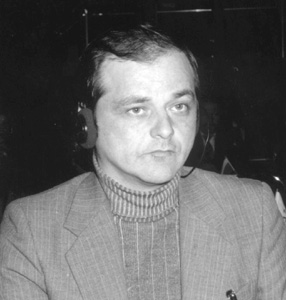
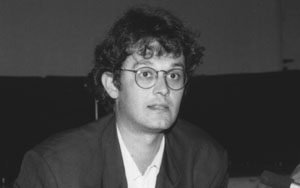
15 January - Russia: Moscow - Meetings
About 80 people take part in the assembly of "members of the RP who live and work in Moscow". Chaired by Mamuka Tsagareli. the assembly debated the "Guidelines for Political Objectives" proposed by Secretary Bonino and approved by the GC. Thirty-three new members join the RP.
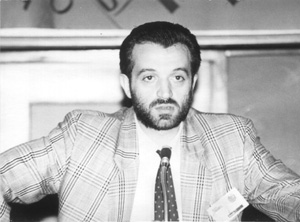
16 January - Russia: St. Petersburg - Assembly
A meeting chaired by RP general councillors Gleb Lebedev and Fedor Chub is held at the Radical Office in the Nevsky Prospect to organize the relaunching of Radical initiatives. It is attended by about 50 people and, at the end of the meeting, 29 decide to become members for that year.

22 January - Ukraine: Kharkov - Assembly
Approximately 30 citizens, including many journalists, participate in the Radical assembly chaired by general councillors Vladimir Ivanov and Aleksandr Kostrickij. Thirteen new members join the RP.
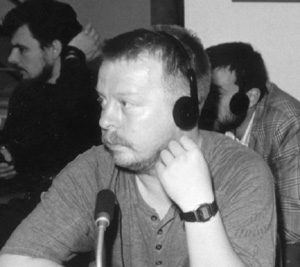
30 January - Bosnia-Herzegovina: Sarajevo - Media, International Tribunal
The Italian news programme "Studio Aperto", which has been broadcasting live from Sarajevo for several days to denounce the silence maintained by the press on the Bosnian situation, interviews Sandro Ottoni, member of the RP Secretariat, concerning recent initiatives to render the Ad Hoc Tribunal for war-crimes operative.
7 February - Italy: Rome - Nonviolence, Antiprohibitionism
Maurizio Turco, Secretary of CoRA and member of the RP Secretariat, begins a hunger strike directed at Health Minister Maria Pia Garavagli, for all the forms of treatment and useful drugs, in all existing structures and preparations, public and private, already available to AIDS patients, to be put at the disposal of drug addicts, thus respecting the result of the referendum held in Italy in April 1993.
Minister Garavaglia replies after 18 days, engaging herself to authorize the use of substitute drugs in the name of freedom of treatment.
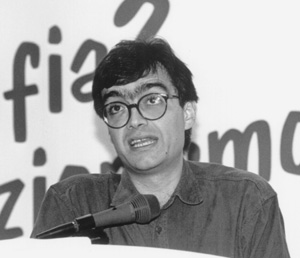
10 February - Italy: Rome - Ad Hoc Tribunal for the Former Yugoslavia
The Commission for Foreign Affairs of the Italian Chamber of Deputies unanimously approves an amendment, presented by RP Treasurer Ottavio Lavaggi and Emma Bonino, providing for a contribution of 3 billion Lire from the Italian State to help finance the activities of the Ad Hoc Tribunal for the year 1994.
11 February - Bulgaria: Sofia - AIDS, Antiprohibitionism
More than one hundred people, including lawyers, doctors and deputies, attend the RP assembly on antiprohibitionism and new strategies in the fight against AIDS and pandemic diseases. Michele Boselli and Filippo Di Robilant are among the speakers.
15 February - Italy: Rome - International Language, "Translimen!"
Press conference to present TRANSLIMEN!, a newsletter providing information on the campaign for the right to an international language. The bilingual newsletter, with a parallel Esperanto text, is published in Italian and translated into Russian, French, German, and Spanish, for distribution throughout Italy, and in the European Parliament, the countries of the former Soviet Union, France, Belgium, Germany and Spain.
19 February - Italy: Rome - Ad Hoc Tribunal for the Former Yugoslavia
After yet another massacre in Sarajevo, still under siege, the Radical Party joins a demonstration of support for the Bosnian capital, organized by the Rome Municipal Council, and renews its appeal to the United Nations for the immediate approval of the budget that will render operative the Tribunal to judge war-crimes committed in the Former Yugoslavia
23 February - Italy: Rome - International Language, Esperanto
Demonstration outside the Ministry of Education to urge the Minister to issue a decree adding the international language Esperanto to the four foreign languages taught in Italian elementary schools. The Minister is also asked to include the international language in experiments with a second foreign language conducted in high schools.
26 February - Italy: Rome - Ad Hoc Tribunal, International Criminal Court (ICC)
With an international appeal, "No Peace Without Justice", the Radical Party launches a nonviolent campaign to support UN resolutions on the Ad Hoc Tribunal for crimes committed in the Former Yugoslavia, and to start the Tribunal functioning immediately.
The appeal also recommends the urgent establishment of a Permanent International Criminal Court, as an instrument of international law to punish violations of human rights, wherever they may take place.
27 February - Russia: Moscow - Andrea Tamburi
After a desperate three-day search, the Radical Party receives news that Andrea Tamburi, member of the General Council and Coordinator of initiatives in Eastern Europe, is dead. He was attacked while returning to his home in Moscow and died of a cerebral haemorrhage, and other wounds, in the hospital, after remaining in a coma for three days. The incompetence and confusion in Moscow hospitals prevented his comrades from locating and caring for him. The fact that he never regained consciousness is the only consolation.
Despite two inquiries conducted by the Italian and Russian magistratures, during which the Russian Secret Service deliberately tried to put them off the scent, the people responsible for Andrea’s murder still have not been identified. He supposedly died accidentally, after being robbed, but doubt has been cast on this theory by certain newspaper reports that have alluded to a political killing but cannot provide any evidence of this.
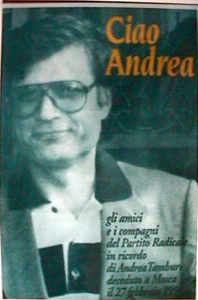
February - International Language
The Esperanto Radikala Asocio presents to UNESCO the Fundapax project on the use of Esperanto in elementary schools, following its approval by the Italian Commission. Fundapax is then included in the framework of the Linguapax project.
Historical references:
- 2 March. European Union. Requests for membership by Sweden, Finland, Austria and Norway are accepted. The referendum on ratification is defeated in Norway, which is the only country that does not join.
4 March - Italy: Rome - Easter March
Obtaining support for the international campaign to abolish the death penalty worldwide by 2000 and to suspend executions, the approval of the budget for the Ad Hoc Tribunal and the institution of the International Criminal Court for crimes against humanity, are the objectives of the Easter March, which is presented at a press conference by Emma Bonino, the Mayor of Sarajevo Muhamed Kresevljakovic, the Mayor of Rome Francesco Rutelli, and Sergio d’Elia. The March is being organized jointly by the Radical Party, Hands off Cain and the Caritas Diocesana (a Catholic charity organization).
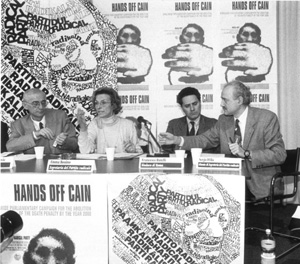
10 March - Italy: Rome - Tibet
On the 35th anniversary of the bloody repression of the Lhasa uprising by the occupying Chinese forces, the Radical Party joins the demonstration organized by the Italia-Tibet association outside the Chinese Embassy.
12 March - Bosnia: Sarajevo - Easter March
The Mayor of Sarajevo writes to Italian and European mayors asking them to participate in the Easter March, bearing aloft the gonfalons of their respective cities.
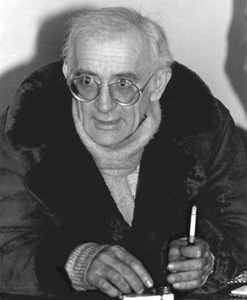
12 March - Italy: Rome - Nonviolence, Ad Hoc Tribunal
Olivier Dupuis, President of the RP General Council, begins a hunger strike (which lasts 28 days) directed at the members of the Fifth Commission of the United Nations, to obtain a decision on the funding for the Ad Hoc Tribunal for crimes committed in the Former Yugoslavia.
Hundreds of citizens from dozens of countries, and 20 parliamentarians, join the hunger strike. Thousands of people mobilize, sending faxes and telegrams to the Fifth Commission of the UN.
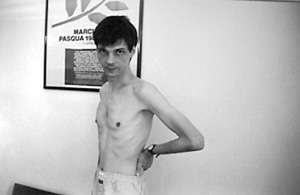
Historical references:
- 18 March: Former Yugoslavia. The Croatians and the Sarajevo authorities sign an agreement for the creation of a Croatian-Muslim Federation in Bosnia, which is opposed by the Bosnian Serbs.
- At the end of March, a cease fire is agreed at the Croatian front in Kraijna, which lasts until early 1995.
23 March - Italy: Rome - Media
During a press conference at the Radical Party headquarters, Italian photographer Oliviero Toscani explains why he used the blood-stained uniform of a soldier killed in the Former Yugoslavia, to create images for an advertising campaign. "I asked myself why no one wanted to see or look at what was going on, why no one wanted to assume responsibility for this war. It was like some sort of taboo. So I started working on an image that would symbolize the dead soldier that no one wanted to see." The image of that "known" soldier, seen all over the world in the previous weeks, had actually been banned by the Italian Advertising Board.
The photograph is donated by Toscani and Benetton to the organizers of the Easter March, to publicize its objectives.
27 March - UN: New York - Ad Hoc Tribunal
Ambassador Hadid, Chairman of the Fifth Committee of the UN General Assembly, receives Marino Busdachin, Radical exponent at the United Nations, to inform him about the situation on the approval of the budget for the Tribunal to judge crimes in the Former Yugoslavia.
Ambassador Hadid thanks the Radical Party and the "No Peace without Justice" Committee for the work that they are doing to support the Tribunal initiative, and particularly the 300 people on a hunger strike directed at him and his Commission. "I won’t let you down", Hadid promises. On 6 April, the Fifth Commission decides to approve the budget that will permit the Ad Hoc Tribunal to function for the whole of 1994.
3 April - Italy: Rome - Easter March
Despite heavy rain, thousands of people take part in the Easter March for a moratorium on executions and for the institution of the International Criminal Court, promoted by the Radical Party, the Mayors of Sarajevo and Rome, the Caritas Diocesana and Hands off Cain.
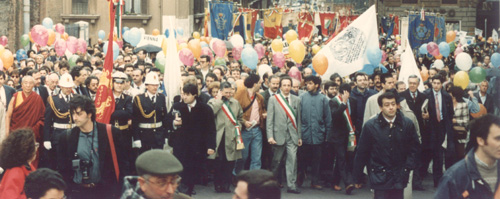
The March is led by the Mayor of the Bosnian capital, representatives from the massacred cities of Guernica, Volgograd (former Stalingrad), Cassino, Vukovar and Osijek, and bearers holding aloft the gonfalons of dozens and dozens of European cities that have joined the "No Peace Without Justice" Committee.
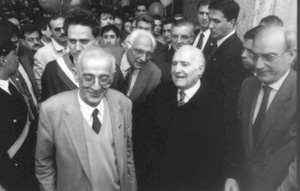
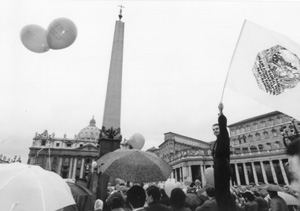
For the first time, the pontiff delivered his Easter greetings also in Esperanto, upon the explicit request of the Esperanto Radikala Asocio and the Radical Party.

9 April - UN: New York - Nonviolence, Ad Hoc Tribunal
As requested by Olivier Dupuis, President of the RP General Council, and hundreds of citizens who joined him on a hunger strike aimed at the Fifth Commission, a budget of 11 million dollars is approved to enable the Tribunal for crimes in the Former Yugoslavia to begin its work.
25 April - Italy: Rome - Former Yugoslavia
"The ‘Free Bosnia!’ flag will hang from the windows of the Radical Party! No Italian flag, no celebrating Liberation Day, if there is no liberation for Bosnia". With these words Emma Bonino explains the 25 April Radical initiative, at a press conference. "In an Italy that celebrates Liberation Day while, a few kilometres from her borders, genocide is being inflicted and human rights are being crushed, we shall not hang out the Italian flag or celebrate, but hang out the ‘Free Bosnia!’ flag, in the name of the dead and those still under siege - many of whom are already as good as dead - for a just peace that will reinstate human rights and the rule of law".
25 April - Italy: Rome - Media, "Transnational"
The first issue of Transnational - Radical Party Newsletter is published, translated into ten languages, and sent to about 6,000 selected recipients in 32 countries.
The informative newsletter is aimed principally at parliamentarians, but is also sent to Radical members and sympathizers, as well as to the media. It is edited in Rome, transmitted electronically to RP offices in several countries, then translated, typeset and mailed locally.
2 May - Italy: Rome - Death Penalty
"They’re going to kill me in May". Hands off Cain organizes an international mobilization to save the life of Paul Rougeau, a condemned prisoner who has been on death row in Texas for 16 years. A press conference is held at the Radical Party headquarters, attended by representatives of Amnesty International and the "Comitato Non uccidere"; and a sit-in is staged outside the American Embassy.
4 May - EP: Strasbourg - International Language
Dozens of people from several European countries take part in the demonstration organized by the Radical Party to support the amendment to the "Leonardo" project, presented by Marco Pannella at the European Parliament.
The amendment proposing a common language/bridge for professional training in Europe, is later rejected.
9 May - Italy: Rome - International Criminal Court
"To assume all the appropriate institutional and diplomatic initiatives to ensure that the UN General Assembly settles, at its 49th Session, all the unresolved political issues and decides to establish the International Criminal Court for crimes against humanity". This is the commitment laid down in a draft parliamentary motion distributed by the Radical Party, which is signed and deposited by parliamentarians in Albania, Austria, Azerbaijan, Belgium, Bulgaria, France, Kosovo, Ireland, Romania and Russia.
11 May - Ukraine: Kiev - International Criminal Court
About a hundred Radical activists from the city of Kiev and the entire region take part in the meeting convened to discuss the organization of the campaign for the establishment of the International Criminal Court.
13 May - Bulgaria: Burgas/Plovdiv - Media
The press conference held by Michele Boselli, RP general councillor, and Darinka Kircheva to present the Radical initiatives in favour of the International Court and the abolition of the death penalty, receives wide coverage in the daily press.
16 May - Switzerland: Geneva - International Criminal Court
A Radical delegation, including Emma Bonino and Filippo di Robilant, and a second delegation of members of Parliamentarians for Global Action, led by Secretary Ken Graham, meet with the Secretary-General of the International Law Commission - auxiliary organ of the United Nations responsible for drafting the Statute of the International Criminal Court - and various members of the Juridical Commission. The aims of the meeting are to obtain the draft Statute for the ICC by the end of July, and to exclude the death penalty from the sentences handed down by the Court.
16 May - Croatia: Zagreb - Antiprohibitionism
Sandro Ottoni, member of the Radical Secretariat, holds a conference at the Sociology Department of the School of Medicine on the theme of antiprohibitionism on drugs.
18 May - Italy: Rome - "No Peace Without Justice!"
"No Peace Without Justice", the international committee of parliamentarians, mayors and citizens, is formally constituted to raise the awareness of international public opinion concerning the activities of the Ad Hoc Tribunal for the Former Yugoslavia, including the provision of defence counsel and the verification of proof during the relative trials; and to insist on the establishment, by the UN General Assembly, of the International Criminal Court for crimes against humanity.
Lord Ralf Dharendorf, one of the fathers of Liberal Democratic theory in Europe, was among the first to join "No Peace Without Justice", almost immediately after it was set up.

26 May - Italy: Rome - AIDS, Antiprohibitionism
CoRA and reformist deputy Elio Vito, deposit at the Italian Chamber of Deputies 50,000 authenticated and certified signatures, on two bills concerning drugs and AIDS. The first bill aims to obtain an antiprohibitionist policy on drugs and the legalization of "soft" drugs, while the second asks for new initiatives to be undertaken regarding the prevention and cure of AIDS.
27 May - Russia: Moscow - Death Penalty, International Criminal Court
Radical activists in Russia stage a protest outside the Armenian Embassy to obtain the suspension of the death sentence imposed on Jurij Belechenko, and to insist on the establishment of the International Criminal Court for crimes against humanity. Belechenko is pardoned in November, after several months of mobilization.
28 May - Italy: Rome - Antiprohibitionism, Seminar
At the close of the international seminar on drugs for the reform of the UN Conventions on drugs, the relative "Comitato Internazionale di Parliamentari and Cittadini" (International Committee of Parliamentarians and Citizens) is set up.
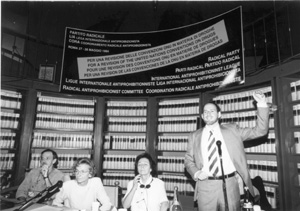
Historical references:
- 29 May: Hungary. The PSU (Socialist Party) obtains an absolute majority; nevertheless, a coalition government is formed.
1 June - Italy: Rome - International Criminal Court
The Commission for Foreign Affairs in the Italian Chamber of Deputies, approves a resolution, presented by Emma Bonino, concerning the situation in Rwanda, requesting, among other things, that the establishment of an International Court for crimes against humanity be supported and promoted at the 49th Session of the UN General Assembly.
2 June - Italy: Rome - Death Penalty
The Radical Party and Hands off Cain organize a demonstration on the steps of the Capitol during President Clinton’s visit to Rome. Rome citizens are invited to record a message for Clinton, asking him to abolish the death penalty in the U.S.
The American President is also presented with one hundred motions from regional, provincial and municipal councils, asking for a moratorium on executions in the United States, with a view to abolishing the death by the year 2000.
3 June - Italy: Rome - Nonviolence
On the 5th anniversary of the Tien An Men massacre, Radical activists of different nationalities hold a silent demonstration to remember the thousands of Chinese victims, and the massacres carried out in the last five years.
3/4 June U.S.: New York -Ad Hoc Tribunal, ICC
Emma Bonino, coordinator of the Parliamentarians for Global Action’s international law and human rights programme, chairs a meeting of the organization (an international network of parliamentarians engaged on international political issues) to discuss the situation on the Tribunal for the Former Yugoslavia and the International Criminal Court for crimes against humanity.
6 June - U.S.: New York - United Nations
Radical Party Secretary Emma Bonino is appointed by the Italian Government, on the strength of her being "an expert witness and in consideration of her extensive knowledge in this field", to present a report on global problems of development, cooperation, and the reform of the UN.
7 June - Italy: Rome - ICC, Antiprohibitionism, Tibet
The "Majority Contract" signed by Italian Prime Minister Silvio Berlusconi and Marco Pannella, leader of the "Club Pannella-Riformatori", provides for the Italian Government to engage itself on issues such as antiprohibitionism, Tibet and the International Criminal Court, as anticipated in the Sofia Motion passed by the General Council of the Radical Party in July 1993.
10 June - Italy: Rome - Ad Hoc Tribunal, Media
"No Peace Without Justice" organizes the world premiere of the film Bosna by Bernard Henry Levy. After the screening, Cherif Bassiouni, Chairman of the Commission of Inquiry for Crimes Committed in the Former Yugoslavia, spoke on the radio from New York, presenting to the press the report documenting the acts of violence, crimes and genocide committed in the Former Yugoslavia. The report is approved by the UN Secretary-General, a few days later.
16 June - Italy: Rome - Tibet, Nonviolence
A guest of the Radical Party and Hands off Cain, Tenzin Gyatso, the fourteenth Dalai Lama and Nobel Peace Prize winner, holds a press conference with Emma Bonino, Sergio D'Elia and Marco Pannella, at the RP headquarters. The Dalai Lama, who joined Hands off Cain on the occasion of the UN World Conference on Human Rights in Vienna in June 1996, spoke of the power of nonviolence, tolerance and dialogue, and the situation in which his country finds itself.
The Dalai Lama is also received, for the first time, by the Italian President, Scalfaro, and the Prime Minister, Berlusconi, after the latter had engaged himself with the Radical Reformist movement, dismissing the protests of the Chinese Government and leaders of the association of Italian industrialists.
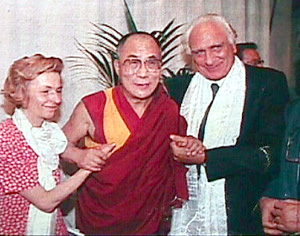
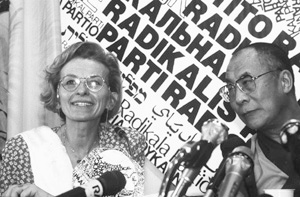
22 June - Czechoslovakia: Prague - Environment
Paolo Pietrosanti and the Minister for the Environment of the Czech Republic hold a press conference to present to journalists the Czechoslovakian translation of Al Gore's book Earth in the Balance, sponsored by the Radical Party and the American Embassy in Czechoslovakia.
23 June - Italy: Rome - Death Penalty
On the initiative of Hands off Cain a motion for a universal moratorium on executions signed by one hundred senators, including leaders of the main party groups, is presented in the Italian Senate (and in the Chamber a few days later).
8/9 July - Russia: Moscow - Assembly
A public meeting is held by the members of the RP General Council, resident in the Commonwealth of Independent States and in the Baltic States, chaired by Ottavio Lavaggi, RP Treasurer, Olivier Dupuis, President of the General Council, Mamuka Tsagareli, Vice-President of the GC, and Antonio Stango, member of the Secretariat. The issues confronted include, the abolition of the death penalty from the Constitutions of the nascent States - following the example of Georgia - and a relaunch of the antimilitarist initiative.
Historical references:
- 12 July, Germany: the Court rules that German troops can take part in international military missions.
12 July - U.S.: New York - Ad Hoc Tribunal
A few days after the appointment of Richard J. Goldstone as Public Prosecutor of the Ad Hoc Tribunal for war crimes committed in the Former Yugoslavia, Antonio Cassese, the presiding judge of the Tribunal in The Hague, writes to Emma Bonino to thank her "for her generous support and her timely initiatives", assuring her that "the first trials will be held soon".
20 July - Italy: Rome - Death Penalty, ICC
The Italian Chamber of Deputies unanimously approves a parliamentary motion, engaging the Government to ask the UN to institute a moratorium on executions, promoted by Hands off Cain and the Radical Party and signed by 120 deputies and 110 senators (first signatory in the Chamber Emma Bonino). The motion also commits the Government to strive to obtain from the UN Security Council a moratorium on death sentences in cases of coup d'état and civil war, and to support and promote the institution of the International Criminal Court for crimes against humanity, by the UN General Assembly.
22 July - Belgium: Brussels - Ad Hoc Tribunal for the Former Yugoslavia
The European Parliament incorporates into the resolution embodying the conclusions of the Council of Europe meeting on Corfu, the amendment presented by the Radical group (ARE), and taken up by the Liberal group (LDE), the Greens and the Popular group, on the Ad Hoc Tribunal for war crimes in the Former Yugoslavia.
The amendment states: "The European Parliament emphasizes that there can be no peace without justice and, to this end, welcomes the appointment of the Public Prosecutor and, consequently, the removal of the last obstacle that was preventing the international Ad Hoc Tribunal for crimes committed in the Former Yugoslavia from functioning; and stresses that the Tribunal should not limit its sphere of action to the actual perpetrators of the crimes but should bring to justice those responsible at the political level".
26 July - Ukraine: Kiev / Russia: Moscow / Italy: Rome / Bulgaria: Sofia - Human Rights, Cuba
Demonstrating outside the Cuban Embassies, Radical activists request the immediate release of Francisco Chiaviano Gonzales, member of the Radical Party and President of the National Council of Civil rights, and several other Cuban political prisoners known for their human rights activities, who have come to symbolize the many prisoners held on similar charges.
15 August - Italy: Rome - Death Penalty
A table, flanked by life-size model of an electuric chair, is set up at the Trevi Fountain to collect signatures on a petition urging the Italian Government to maintain its commitment on the moratorium on executions.
More than 500 Romans and tourists from all over the world sign the petition and, in the evening, a fax more than 20 metres long is sent to the Italian Prime Minister.
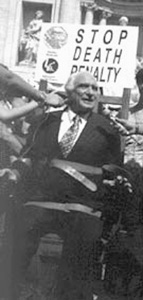
18 August - Italy: Rome - Death Penalty
The Radical Party and Hands off Cain organize a sit-in outside Palazzo Chigi, the Italian parliament, in which members of the African community in Rome also take part, to stop executions and to ask the Italian Government to present at the UN General Assembly a draft resolution calling upon Member States who have not yet abolished the death penalty to do so.
19 August - Italy: Rome - Death Penalty
Italian Foreign Minister Antonio Martino accepts motions from both houses, promoted by the Radical Party and Hands off Cain, which engage the Government to present at the UN General Assembly a draft resolution asking for the universal suspension of executions and the abolition of the death penalty by 2000.
24 August - Hungary: Budapest - Death Penalty
In a letter to the Radical office in Budapest, Hungarian Foreign Minister Laszlo Kovacs pledges his country's support, at the United Nations, for the abolition of the death penalty in the world.
2 September - Croatia: Zagabria - Ad Hoc Tribunal, ICC
At the European Cultural Centre, personalities from the world of politics and culture, Croatians, Serbs, Bosnians, and members of the Radical Party, hold a press conference at which they distribute an appeal sent to the Pope, on the occasion of his visit to Zagreb. The appeal, in the form of a letter, asked the Pope to express "the sincere hope that the International Tribunal to judge crimes committed in the Former Yugoslavia will be the first step towards the establishment of the International Criminal Court that will reaffirm those human rights that are crushed in the majority of the world, so that they may become the pillars of a new international jurisdiction".
4 September - Egypt: Cairo - United Nations
Emma Bonino takes part in the Cairo Conference on Development and Population.
10 September - Italy: Rome - Mariateresa Di Lascia
Mariateresa Di Lascia dies after a sudden, brief illness.
A Radical activist since 1980, several times member of the RP Secretariat and the General Council, and Italian deputy elected on Radical lists, she had recently founded and coordinated the Hands off Cain campaign to abolish the death penalty worldwide by 2000. In June 1995 her novel Passaggio in ombra would be awarded the Premio Strega, the highest Italian literary award.
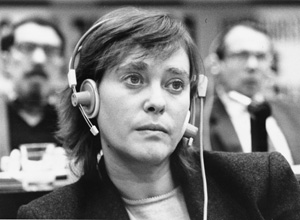
Mariateresa
12 September - Italy: Rome - ICC
The Radical Party distributes an international appeal addressed to the UN Secretary-General, the Chairman of the General Assembly, the Chairman of the Fifth Commission of the General Assembly and the representatives of Member States, asking that the 49th Session of the GA discuss the draft statute of the International Criminal Court elaborated by the International Law Commission and convene in 1995 a UN Conference to approve the Treaty relative to the establishment and functioning of the Court.
28 September - U.S.: New York - Media, ICC
"Mayday, Mayday America" is the headline chosen for the double-page spread featured in The New York Times to inform Americans about the activities of the transnational Radical Party. The advertisement, financed by the Party, is timed to coincide with the opening of the 49th Session of the UNGA and with the appointment of Emma Bonino as the Italian Government's representative at the debate on the International Criminal Court.
28 September - U.S.: New York - ICC
As the Italian Government's representative regarding the ICC and its establishment, Emma Bonino meets with Luis Barnuevo, President of the UN Security Council.
29 September - Italy: Rome - Death Penalty
The Radical Party and the abolitionist organization Hands off Cain demonstrate outside Montecitorio, the Italian parliament, to have the death penalty abolished definitively from the military codes and to launch a massive self-financing Cameron entitled "New York, New York". The campaign aims to publish in The New York Times the texts of the appeal for the International Criminal Court and of the Italian resolution on the moratorium on executions, on the same day that these two issues are discussed at the UN General Assembly.
4 October - Belgium: Brussels - Death Penalty
The Parliamentary Assembly of the Council of Europe approves a resolution - drafted by Swede Hans Franck, member of Hands off Cain - asking the 32 Member States to "eradicate the death penalty from their military and criminal codes".
5 October - Italy: Rome - Death Penalty
The Italian Chamber of Deputies approves the abolition of the death penalty from the military codes. Italy becomes the 34th country to abolish the death penalty completely, thanks also to the mobilization of the Radical Party and Hands off Cain.
13 October - Italy: Rome - ICC
To date, 7 Nobel laureates, 165 leading personalities, 610 parliamentarians and 272 administrators of local government, from 30 countries throughout the world, have signed the appeal sent out by the Radical Party for the immediate establishment of the International Court.
Historical references:
- 16 October - Germany: Helmut Kohl is re-elected Chancellor, with a narrow majority.
21 October - Italy: Rome - Media "New York, New York"
With parliamentarians from a broad political spectrum, Emma Bonino and Sergio D’Elia, Secretary of Hands off Cain, hold a press conference to present the "New York, New York" initiative aimed at buying space in American newspapers to promote the establishment of the International Court and the universal moratorium on executions; and at sending to New York an international delegation to pursue the proposals with the United Nations.
24 October - Russia: Moscow - ICC
Demonstration outside the American Embassy in Moscow to obtain the institution of the International Court. Anatolij Shabad, member of the Duma., Marat Zahidov, Uzbekistan deputy and RP general councillor, Mamuka Tsagareli, Nikolaj Khramov, and various reporters were among the demonstrators, who waved banners and asked to be received, to no avail.
25 October - UN: New York - ICC
As spokeswomen for the Italian Government concerning its position on the establishment of the International Criminal Court, Emma Bonino takes the floor during the debate in the Fifth Commission of the UN General Assembly. "With your permission, we would like to express our full support for the Draft Statute of an International Court that the International Law Commission has elaborated, with the help of an ad hoc group. The Draft Statute is ready and the 49th General Assembly can establish the procedure for the institution of the International Court by convening an international Conference in 1995 to adopt the institutional Treaty of the Court. The Italian Government would be happy to host such a conference".

26 October - U.S.: New York - Human Rights
Emma Bonino holds a conference at the Italian Cultural Institute on the International Court and the violation of human rights.
26 October - U.S.: New York - Death Penalty
Italian Ambassador to the United Nations, Francesco Paolo Fulci, together with the Ambassadors of Malta, Guinea Bissau, Honduras and Cambodia, sends a memo to Secretary-General Boutros Boutros Ghali, asking that the issue of the death penalty be put on the agenda of the 49th Session of the General Assembly.
28 October - Italy: Rome - European Union
The Italian Government appoints Emma Bonino as European Commissioner.
"I am grateful and indebted to Prime Minister Berlusconi for honouring me with this appointment. I shall assume this new responsibility with a total commitment, to serve Italy and the European institution of which I am part, and to promote the values and ideals of the transparty, transnational Radical Party", Bonino declared.

28 October - U.S.: New York - Media
Thanks to the money donated by citizens and parliamentarians in Italy during the "New York, "New York" campaign, an advertisement featuring a photo of film director Bernardo Bertolucci in a life-size model of the electric chair and an appeal, "Give justice a chance!", asking the United Nations to establish the International Criminal Court, are published in The New York Times.
29 October - Croatia: Zagreb - ICC, Death Penalty
A delegation from the Radical Party, composed of Zdravko Tomac, Sandro Ottoni and other Radical exponents, meets with Croatian President Franjo Tudjman to present the Radical initiatives for the institution of the International Court and the universal moratorium on executions. The President assures the delegation that Croatia will commit itself with the UN on these issues.
11 November - Bosnia-Herzegovina: Sarajevo - ICC, Death Penalty
Radicals Adnan Kemura of the Solidarity for Bosnia Committee and Sandro Ottoni, member of the RP Secretariat, hold a series of meetings and a press conference in Sarajevo, to communicate the initiatives for the establishment of the International Criminal Court and for the universal moratorium on executions.
They also present solidarity initiatives, such as "adopting" a child, the rebuilding of the city's mill, fund-raisers to obtain money and medicines (a concert, a photographic exhibition, etc.)
14 November - UN: New York - Death Penalty
With 70 votes in favour, 24 against and 42 abstentions, the UN General Assembly agrees to place the issue of the death penalty on its agenda.
18 November - U.S.: New York - Ad Hoc Tribunal
No Peace Without Justice , the Centre for the Study of Human Rights and the Human Rights Law Review, organize a seminar at Columbia University, led by Antonio Cassese, the Presiding Judge of the Ad Hoc Tribunal for the Former Yugoslavia.
23 November - Italy: Rome - ICC, Death Penalty
Led by Emma Bonino, a delegation of parliamentarians, mayors, prominent personalities and citizens belonging to the "New York, New York" campaign meet with UN Secretary-General Boutros Boutros Ghali. The Radical Party presents the Secretary General with the 6,000 signatures (including those of 7 Nobel laureates, 800 parliamentarians and 150 mayors, from 30 countries in all) on the appeal asking the General Assembly to convene, at the earliest, the Conference to establish the International Court, and on another petition for the universal moratorium on executions. "This is something revolutionary", commented Boutros Ghali. "Thank you for your initiatives. Thank you for taking action. Maintain your dialogue with the United Nations. The UN needs you to take action. We need this direct contact with the peoples of the world".
26 November - Italy: Rome - Death Penalty
The Radical Party and Hands off Cain organize the sending of faxes by deputies and prominent personalities from the countries of Latin America, Africa, Eastern and Central Europe, and Asia, asking the UN representatives of their countries to support the proposal for a universal moratorium on executions.
29 November - UN: New York - ICC
The Fifth Commission of the UN General Assembly approves by consensus a draft resolution on the establishment of the International Criminal Court.
The resolution, ratified by the General Assembly on 9 December, provides for the setting up of an Ad Hoc Committee, to which all UN Member States may accede, which will meet twice in 1995 to examine the Draft Statue and to set a date for the international Conference at which the Treaty instituting the Court will be opened for signature.
1 December - U.S.: New York - Media
Thanks to the Italian citizens who contributed to Operation "New York, New York", the Radical Party and Hands off Cain are able to publish a full-page abolitionist "advertisement" in The New York Times. As well as the names of some of the people who financed the initiative, there are also those of many personalities who have signed the appeal for the abolition of the death penalty by 2000, including His Holiness the Dalai Lama, Italian President Scalfaro, Hungarian President Arpad Gomez, Czech President Vaclav Havel, Nobel laureates Mairead Corrigan Maguire, Franco Modigliani, Abdus Salam, George Wald and Elie Wiesel. The advertisement also announces an international Conference for the Abolition of the Death Penalty by 2000, to be held in the U.S. in 1998.
6 December - Russia: Moscow - AIDS
Radical demonstration near the Council of the Russian Federation, while it is discussing a bill to introduce HIV tests for all foreign citizens in the country. On the initiative of the RP, several scientists and experts send the Council a letter stressing the futility of the measure, which the WHO also considers inadvisable.
7 December - UN: New York - Death Penalty
With 65 votes in favour, 74 against and 20 abstentions, the Third Commission of the United Nations rejects the no action motion presented by Singapore with the intention of blocking the vote on the universal moratorium on executions and the abolition of the death penalty by 2000. A torchlight vigil is held in Campo de' Fiori (a square famous for its executions in centuries past) in Rome, and a radio link with New York established by Radio Radicale, so that listeners could follow the debate and the voting on the moratorium.
9 December - UN: New York - Death Penalty
With 36 votes in favour, 44 against and 74 abstentions, the Third Commission of the United Nations turns down the draft Resolution on the universal suspension of executions and the abolition of the death penalty by 2000, presented by the Italian Government, and supported by the Radical Party and Hands off Cain.
The final vote was influenced by an amendment presented by Singapore and approved by the Commission, which claimed "the sovereign right of States to determine the most appropriate legal measures and punishments for their society to effectively combat the most serious crimes". The amendment avoided making any reference to either International Law or the Charter of the United Nations. The resolution that was finally approved modified the Italian proposal, limiting it to calling upon "all States that have not yet abolished the death penalty to consider instituting a moratorium on pending executions, with a view to affirming the principle according to which no State can dispose of the life of a human being, throughout the world by 2000", at least recognizing the principle as valid. Prior to the final vote, a second no action motion on the draft resolution, presented by Egypt, was defeated.
14 December - Belgium: Brussels - Former Yugoslavia, Bosnia-Herzegovina
With 198 votes in favour, 198 against and 14 abstentions the European Parliament rejects the amendment, presented by Marco Pannella and others, calling upon the EP not to enact agreements based on the division of Bosnia-Herzegovina and, therefore, on the "legal recognition of the effects of ethnic cleansing".
20 December - Italy: Rome - "It's Not Only Italy", Membership
While the "tribal rites of party politics" hold sway in Italy, the Radical Party demonstrates outside Montecitorio (the Italian parliament), during the government crisis and the ensuing parliamentary debate, with the slogan "It's Not Only Italy". Radicals call on parliamentarians from all parties to join the RP, which has enabled Italy to bring the establishment of instruments of international justice and the suspension of executions, to the attention of the international community.
Historical references:
- December. Chechnya. The Moscow Government sends the Russian army to quash the country's bid for independence. Grozny is attacked, but local forces are able to resist.
22 December - Italy: Rome - Human Rights, Romania
"Romania: la rivolta e l’illusione" (Romania: rebellion and illusion) is the title of the photographic exhibition inaugurated in Rome at the headquarters of the RP on the 5th anniversary of the fall of the Ceausescu regime.
Historical references:
- 23 December, Former Yugoslavia. Following pressure from the United States, Muslims and Bosnian Serbs sign a four-month truce.
30 December - Italy: Rome - Human Rights, Chechnya
Radical protest outside the Russian Embassy and letter addressed to President Yeltsin, signed by Marco Pannella, RP Secretary Emma Bonino, Olivier Dupuis, Antonio Stango, Mamuka Tsagareli and Nikolaj Khramov. The letter contains an appeal to stop bloodshed in Chechnya. The Radicals also ask to be allowed to visit Chechnya as observers, making it quite clear that they will "overrule any objections concerning personal safety".
31 December - Various Countries - Former Yugoslavia
The Radical Party collects thousands of signatures, particularly in Spain, Bulgaria and Italy, on a petition drawn up by the citizens of Sarajevo and by the Gruppo 99 (Group 99), calling for an end to the siege and to the ethnic division of Bosnia.
Letter from the Mayor of Sarajevo , Muhamed Kresevljakovic, to the mayors of Italian cities and European capitals, dated 12 March 1994.
"Dear Mayor........, dear friend,
Let me tell you about my city: Sarajevo. About death and massacres; shells raining down on the markets, churches of all denominations, schools and hospitals; people suffering from hunger and cold. You already know about the human beings who are massacred every day. But the mass media have communicated very little about the travesty of legality, of international law and justice in my city. But this is the reality with which my fellow citizens have lived for the past two years. The massacre at the market was simply the most recent. A carnage that added another 70 victims to the 10,000 who have already been butchered here in the space of 22 months. Throughout our suffering, and despite our suffering, we have continued to hope. And for the first time the international community has not remained an onlooker: it has followed up, if only partially, those UN resolutions that we have been awaiting for all this time.
It is precisely in this area that I am asking for your help. Judging and punishing the crimes committed in the Former Yugoslavia, with the necessary authority and seriousness but without imposing the death penalty, must be the first step in affirming a new international law so that the violations of human rights, in all the Bosnias of the world, are legally punished.
I am also asking you to join the Easter March for the establishment of the International Criminal Court and for the universal moratorium on executions, which will take place on 3 April in Rome."
Statement made by Oliviero Toscani at the Press Conference held at the RP headquarters on 23 March 1994
"At the end of September and the beginning of October last year, I used to study the newspapers, especially the Italian dailies. Just a few lines were devoted to the war in Yugoslavia. I asked myself why no one wanted to see or look at what was going on, why no one wanted to assume responsibility for this war. It was like some sort of taboo. So I started working on an image that would symbolize the dead soldier that no one wanted to see. At the same time, quite by chance, I received a letter from a 20-year-old Yugoslav girl who had escaped to Italy. In her letter she said: "I don't know why I am writing to you, but when you touch on an issue, even if others say it helps to sell T-shirts, people talk about the problem. And she went on to list all the problems that existed in her country.
After conducting a search with Benetton's publicity department, we received a number of replies from those who were interested in participating We chose a youth, and then we received a box containing the blood-stained clothes you see in the photograph. And a typewritten letter from the father. The letter had a particularly disturbing effect on me. Above all because I couldn't read it, and I understood that this was symbolic of the fact that not only do we very often not want to understand but also we can’t understand, and we are hard put, as one of my students said, to pick up a dictionary that would help us to understand other people's problems. This is perhaps why I put the father's head in my photograph, because he was part of the box, of the reliquary of the "known soldier" who was a human being rather than a Serb or a Croatian. The image has something of Magritte about it: a dead man who does not exist, the symbol of a dead man who does not exist, or maybe a dead man whom we do not want to see".
International seminar for the revision of the UN Conventions on drugs - Rome, 28 May 1994.
The approved final document: "finding that, despite prohibitionism, drugs circulate freely; that local authorities and institutions are studying alternatives to a repressive strategy", and above all bearing in mind that national prohibitionist laws "translate into domestic law the provisions of the three UN conventions (Vienna Convention on Drugs of 1961 (amended in 1972), 1971 Convention on Psychotropic Substances, 1988 Convention on the Commerce of Drugs), calls upon Governments "to denounce the Convention of 1961 in such a way as to force the convening of a conference of the contracting parties regarding the amendments, aimed at enacting international legislation of an antiprohibitionist nature, for the legal regulation of drugs to effectively put an end to drug-trafficking".
It is our intention to make Governments aware of the need to urgently modify the "UN Conventions" through the presentation of parliamentary motions.
The International Committee is composed of:
Emma Bonino, Marco Taradash, deputy and Secretary of the LIA, Olivier Dupuis. Antonio Eschohotado, Spanish historian, Prof. Ethan Nadelmann, American, Arnold Trebach, American and President of the Drug Policy Foundation, Colombian deputy Gomez Hurtado, Nick Harman of The Economist, Giandonato Caggiano, Gianfranco Dell'Alba, LIA coordinator, Marie Andrée Bertrand, Canadian university lecturer, Joao De Menezes Ferreira, Portuguese deputy, Doru Viorel Ursu, Romanian deputy, Gregorio Lanza, Bolivian deputy, Elena Poptodorova, Bulgarian deputy, Maurizio Turco, Antonio Contardo, LIA treasurer, Luiz Yanez Barnuevo, Spanish deputy, Gabor Nagy, Hungarian deputy, Irina Hakamada, Russian, Jean Luc Robert, Belgian, Tiziana Maiolo, President of the Justice Commission in the Italian Chamber of Deputies, Luigi Manconi, senator, Tiziana Parenti, deputy, Marco Pannella, MEP and President of the Radical Party.
The contract engages the Government:
a) to convene a public international conference on the costs and social benefits of the actual international policies on drugs and on concrete proposals for the revision of the UN Conventions of 1961 and 1963 on the war on drugs;
b) to meet the Dalai Lama on the occasion of his next visit to Italy;
c) to ask the UN to establish an International Criminal Court to judge crimes against humanity. To undertake all the initiatives necessary to see that the International Law Commission finishes its work before July and swiftly delivers the Draft Statute for the Court to the General Assembly. To do everything in its power to ensure that the General Assembly approves the statute at its 49th Session, to be held in September/December, and convenes the international conference to establish the ICC: to this end, the Government will appoint Emma Bonino to express Italy's policy at the meetings of the Assembly dedicated to such matters during the 49th session. Meanwhile, Italy will do everything in its power to ensure that the UN appoints the Public Prosecutor of the International Ad Hoc Tribunal for the Former Yugoslavia".